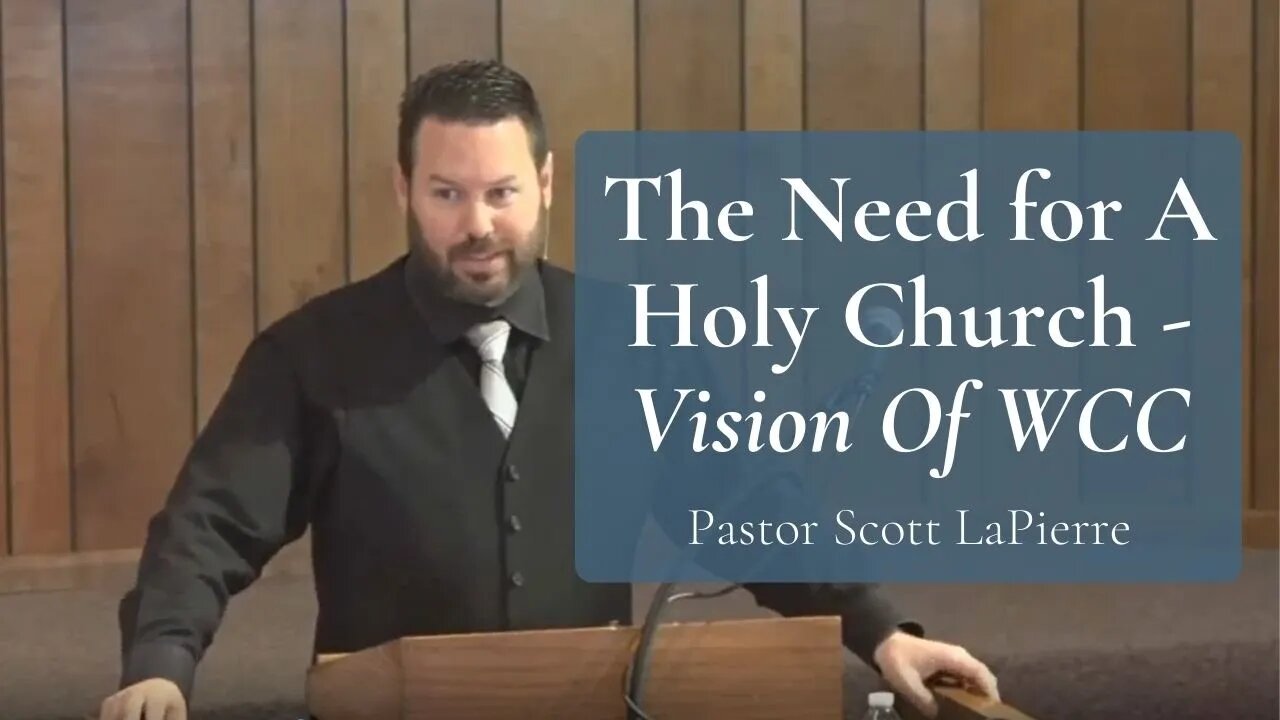Premium Only Content

The Need for A Holy Church | The Vision of Woodland Christin Church
The need for a holy church is great, because just like God called Israel to be holy in the Old Testament, He has called the church to be holy in the New Testament: “As He who called you is holy, you also be holy in all your conduct, since it is written, ‘You shall be holy, for I am holy’” (1 Peter 1 verses15-16). We tend to think something is holy if it is moral or righteous, and something is unholy if it immoral or unrighteous, but it’s better to understand holy means separate. For example:
—When Moses approached the burning bush, God told him he was standing on holy ground, not because the ground was better than other areas of ground, but because it was set apart for God.
—If there were two identical vessels, but one was used in the temple and one wasn’t, the one in the temple was holy because it’s set apart for God.
Israel was holy by keeping ceremonial commands (those dealing with tassels, foods, clothing, farming), and the church is holy by being separate from the world: “Do not be conformed to this world…do not love the world or the things in the world…friendship with the world is enmity with God” (Romans 12 verse 2, 1 John 2 verse 15, James 4 verse 4).
View all of Pastor Scott LaPierre's books on Amazon: https://www.amazon.com/Scott-LaPierre/e/B01JT920EQ
Receive a free copy of Pastor Scott's book, "Seven Biblical Insights for Healthy, Joyful, Christ-Centered Marriages": https://www.scottlapierre.org/subscribe/
Here's the accompanying podcast episode: https://www.scottlapierre.org/the-need-for-a-holy-church/
For Scott LaPierre's conference and speaking information, including testimonies, endorsements, and contact info, please visit: https://www.scottlapierre.org/conferences-and-speaking/
If invited for a speaking engagement, you can expect:
• Professionally prepared and delivered messages
• A handout with lessons and discussion questions
• Copies of Pastor Scott's books to offer as gifts to increase registrations (if you desire)
• Advertising of your event on Scott's website and social media (if you desire)
• Facebook ads and/or a Facebook event page so the event can serve as an outreach (if you desire)
• Prompt responses to any communication
• Prompt replies to phone calls, emails, and/or text messages
00:00 Sermon Lessons for The Need for a Holy Church
03:20 Lesson one: God always has an ____________ and ______________.
10:58 Lesson two: ________________ __________________ the inside from the outside.
18:45 Lesson three: holiness in the church means ________________ ______________________.
32:46 Lesson four: ____________ __________________ churches blur the line between inside and outside.
41:50 Lesson five: draw the line ____ ____________________ when being “all things to all people."
Family Worship Guide for The Need for a Holy Church
Memory verse: Romans 12:2
Directions: Read the verses and then answer the following questions:
Day one: Matthew 21:31, Mark 4:11, Luke 16:16, Colossians 4:5, 1 Thessalonians 4:12, 1 Corinthians 5:12-13, Revelation 22:14. What does it mean that God has always had an inside and an outside? Why do you think this is the case? Can you think of any other examples in the Bible of an inside and outside that were not mentioned in the sermon?
Day two: 1 Peter 1:15, Romans 12:2, 1 John 2:15, James 4:4, Hebrews 12:14). What are some moral commands in the Old Testament? What are some ceremonial commands? What are the differences between them, and why are they so important? What did it look like for Israel to be holy in the Old Testament? What does it look like for the church to be holy in the New Testament? Why is holiness so important for the church?
Day three: 1 Corinthians 9:19-22, Galatians 5:6, 6:15, Acts 15:5, 16:3, 18:18. We appreciate the seeker sensitive churches’ desire to reach the lost, but in what way or ways do they typically err? What does it mean to “be all things to all people”? What does it not mean? How do we know where to draw the line? What are some amoral things Paul did to reach unbelievers? In what way, or ways, is Christ the greatest example of becoming “all things to all people that He might save some”?
-
 8:47:06
8:47:06
Rallied
12 hours ago $21.00 earnedWARZONE SOLO CHALLENGES ALL DAY
135K7 -
 5:05:38
5:05:38
StoneMountain64
9 hours agoBattlefield 6 Favorite Weapons, Vehicles, and Strategies
74.5K -
 1:10:03
1:10:03
Michael Franzese
18 hours agoWhy do we allow incompetent people in government decide our lives?
61.8K52 -
 1:33:49
1:33:49
MattMorseTV
11 hours ago $47.49 earned🔴Trump has a NEW DEAL.🔴
85.1K83 -
 2:55:27
2:55:27
Mally_Mouse
14 hours agoSpicy HYDRATE Saturday! -- Let's Play!
63K6 -
 1:38:06
1:38:06
GameWithV
8 hours ago $4.74 earnedSaturday Play
35.2K1 -
 5:32:09
5:32:09
Spartan
10 hours agoHalo for a bit, Octopath after maybe
42K -
 2:58:09
2:58:09
SavageJayGatsby
11 hours agoSpicy Saturday with Mally! - Wedding in 2 Months!
54.5K1 -
 1:47:14
1:47:14
VapinGamers
12 hours ago $6.74 earnedTools of the Trade - Does Production Matter? with Tim the Tool Man from Louder with Crowder
42.4K3 -
 5:44:04
5:44:04
BSparksGaming
11 hours agoHappy Saturday! Battlefield 6 Beta! PS5 Gameplay
27.3K